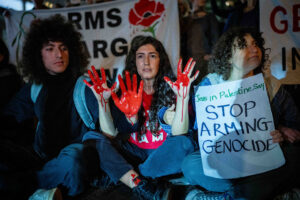This past June, the news of a merger between two veteran Israeli political parties on the left of the Zionist spectrum, Labor and Meretz, passed without much fanfare. With the once-hegemonic Labor Party occupying only four of the Knesset’s 120 seats, and Meretz having been wiped out altogether in the 2022 election, that shouldn’t come as much of a surprise. Lacking a compelling alternative vision to the perpetual subjugation of Palestinians under the boot of the Israeli military, Israel’s parliamentary left — now led by Yair Golan, yet another former army general, who led the calls over the summer for an invasion of Lebanon — has been condemned to irrelevance.
“There is no left-wing politics in Israel; this is a reality many people overlook,” Palestinian activist Hamze Awawde tweeted in July. His remarks came after the Knesset passed a resolution opposing Palestinian statehood by 68 votes to nine, with only lawmakers from Palestinian-led parties voting against it. “While there are some grassroots left-wing movements, left-wing politics as a political force simply doesn’t exist in Israel.”
The question of how leftists can best shift Israeli policy from the inside, in the absence of leftist political leadership, provokes endless debate among activists on the ground. Since the Oslo peace process, conventional wisdom both within and outside the left has dismissed any political potential for Israeli leftists — due to the camp’s small size, its electoral weakness, its infighting, and its abandonment of Palestinian solidarity and leadership.
The left’s complete marginalization, enforced by Israel’s politicized police, has only accelerated since October 7. Even family members of Israeli hostages, who call for a ceasefire in order to free their relatives, are harassed and smeared as leftist traitors. The increased suppression of Palestinian society, too, has radically limited the horizon for dissent or collective political action over the past year. Since just days after the Hamas attack, Palestinian citizens have faced a government-backed campaign of intimidation, persecution, surveillance, and harassment.
Nonetheless, this past year has seen left-wing Israeli activists persist in their efforts to build power in pursuit of a more peaceful, just, and equal future for Israelis and Palestinians.
The more mainstream “peace camp” — which is closer to the Zionist left, largely represented by NGOs and funded by international philanthropy — is currently reconstituting itself following the shock of the October 7 Hamas attacks and the despair of Israel’s subsequent onslaught on the Gaza Strip. Further to their left is a smaller network of organizers who receive less international attention, and who often find themselves sidelined even by the peace camp. Ranging from anti-Zionists to non-Zionists to those who refuse such categories altogether, these activists are at the far-left margin of Israeli society, sometimes identified as the “radical left.”
Unlike the mainstream peace camp, they have unequivocally opposed the current war from its very outset — and they call for the dismantling of Israel’s regime of occupation, apartheid, and Jewish supremacy. They emphasize bottom-up organizing, strengthening Jewish-Palestinian joint struggle, and highlighting the links between Israel’s colonial domination over Palestinians and ethno-class inequality within Israeli society.
Most days, these activists can be found planning or participating in anti-war protests, or engaging in “protective presence” — physically supporting Palestinian communities in the occupied West Bank that are at risk of expulsion through settler and army violence. Many of them have served jail time for refusing mandatory military service, and they regularly join Palestinian-led protests both in the West Bank and inside Israel.
None are under any illusions that internal leftist pressure will be the decisive factor in forcing Israel to end its carnage in Gaza; instead, all of them call on foreign governments to stop sending weapons to Israel. Subdued resignation and despair are the prevailing sentiments. But they see their activism as the bare minimum from their position of relative privilege, even while recognizing the limited material impact of their actions.


